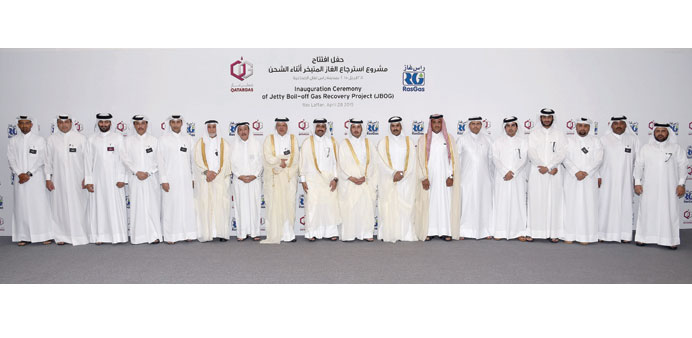HE the Prime Minister and Minister of Interior Sheikh Abdullah bin Nasser bin Khalifa al-Thani and HE the Minister of Energy and Industry Dr Mohamed bin Saleh al-Sada with Qatar Petroleum, Qatargas, and RasGas officials during the inauguration of the $1bn Jetty Boil-Off Gas Recovery (JBOG) Project yesterday.
By Peter Alagos
Business Reporter
The $1bn Jetty Boil-Off Gas Recovery (JBOG) Project in Ras Laffan, described as the “biggest environmental project in the world”, was inaugurated by HE the Prime Minister and Interior Minister Sheikh Abdullah bin Nasser bin Khalifa al-Thani yesterday.
“The JBOG facility will recover the gas flared during Liquefied Natural Gas (LNG) loading at the six LNG berths in Ras Laffan Port,” said Saad Sherida al-Kaabi, president and CEO of Qatar Petroleum (QP).
Al-Kaabi, who is also the Qatargas chairman, said the JBOG facility forms part of the Common Facilities Projects at Ras Laffan, and is led and operated by Qatargas on behalf of QP and RasGas.
As of April 2015, Qatargas has recovered jetty boil-off gas from 500 ships since the JBOG facilities started in October 2014.
Al-Kaabi congratulated Qatargas for leading the “safe and reliable execution and operation” of the project, as well as RasGas’ “continued commitment” towards environmental protection and reducing carbon emissions from the country’s LNG industry.
“Protecting the environment has always been the holistic commitment of Qatar Petroleum and its joint ventures. This commitment is embodied in a number of initiatives, as the project is the largest and most comprehensive in terms of protecting the environment and exploiting the natural resources of the state.
“The JBOG project demonstrates the commitment of Qatar to balance industrial development with care for the environment, and reinforces our pioneering and leadership role in the energy industry,” al-Kaabi emphasised.
Qatargas CEO Sheikh Khalid bin Khalifa al-Thani described JBOG as “a landmark project” for Qatar.
“Qatargas is proud to have been entrusted by Qatar Petroleum with the responsibility of leading the project on behalf of the LNG producers at Ras Laffan Industrial City,” Sheikh Khalid said.
“Qatargas is committed to being a key contributor in the realisation of the Qatar National Vision 2030 and have a proactive and significant international role in assessing the impact of climate change through the responsible production of LNG, while protecting the environment for future generations,” he added.
With 3,500 people working on site at the height of construction activities, the project reached a safety record of 22.6mn man-hours worked without a Lost Time Incident from 2010 to 2015, according to RasGas CEO Hamad Rashid al-Mohannadi.
“The safe, reliable, and efficient execution of the project was made possible by bringing together industry-leading partners, technological expertise, and innovation….This remarkable safety milestone is a testament to Qatargas’ commitment to creating and maintaining an incident and injury-free work environment,” al-Mohannadi said.
“The JBOG project is another milestone in a long history of our commitment to various green-house gas reduction projects, which includes carbon capture initiatives and other flare minimisation programmes.
“The synergy and co-operation demonstrated by both RasGas and Qatargas on this project further strengthen Qatar’s global LNG leadership position.”
The JBOG project salvages gas normally lost and burnt off in a flare when the fuel is transported onto ships.
Officials say it will result in a 90% reduction in flaring at the Ras Laffan port in northern Qatar, the largest LNG export terminal in the world.
Instead of the wasted gas being burnt off, JBOG would collect the fuel and transport it to an area where it is compressed to be ready for use again either as LNG or fuel gas.
LNG is gas cooled to -160 degrees Celsius until it turns into a liquid and can be transported by boat.
The JBOG project would capture enough gas to power 175,000 cars per year or 300,000 homes, officials said.
It also allows Qatar, the largest producer of liquefied natural gas in the world, to recover a further 29mn cubic feet of gas per year.
Officials said it would save the equivalent of 1.6mn tonnes of CO2 each year.
The JBOG Recovery Project won the QP HSE Excellence Award in April 2013. Business page 1

